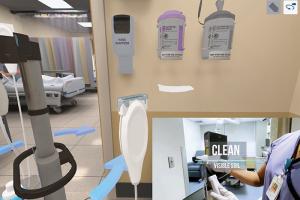Scientists research possible spread of airborne MRSA
MRSA is resistant to many antibiotics used to treat standard staphylococcus infections, putting hospital staff at high risk, so University of Cincinnati researchers are taking steps to protect workers from exposure. A team of scientists, led by Sripriya Nannu Shankar, Ph.D., a faculty member of the university’s college of medicine, has been awarded a $300,000 grant from the Ohio Bureau of Workers’ Compensation to conduct environmental surveillance at the University of Cincinnati Medical Center.
MRSA is primarily transmitted through contact with infected individuals or contaminated surfaces, but new evidence suggests that airborne spread is possible.
“Health care professionals are frontline workers, and it is important to ensure they are protected,” Shankar says. “We intend to collect air samples in hospital units to understand what is present in the air. If we find MRSA, it will help us reconsider practices or existing protocols and perhaps implement additional measures.”
The low concentration of airborne MRSA pathogens presents a challenge: collecting enough air to detect its presence. Ventilation, building design and environmental conditions can significantly impact concentrations, so preliminary sampling from a few sites will help Shankar and her team adjust air sampling protocols to ensure accurate results.
If live MRSA is found in the air, immediate actions may include decontaminating the unit with irradiation or fumigation, increasing air exchange rates and conducting follow-up sampling to confirm the effectiveness of these measures.
“We would also expect the hospital to screen the workers for potential infection, along with environmental monitoring,” Shankar adds.
Researchers also will study the effectiveness of current control measures, including testing patients, periodic disinfection and increasing air exchange rates. Also, Shankar says they will investigate alternative methods.



